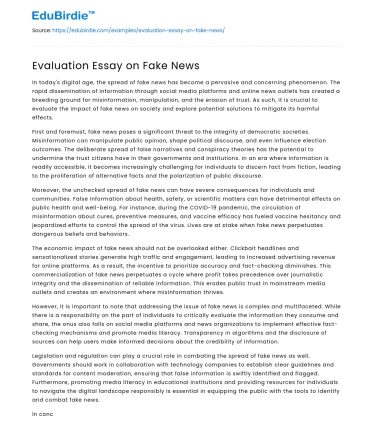In today's digital age, the spread of fake news has become a pervasive and concerning phenomenon. The rapid dissemination of information through social media platforms and online news outlets has created a breeding ground for misinformation, manipulation, and the erosion of trust. As such, it is crucial to evaluate the impact of fake news on society and explore potential solutions to mitigate its harmful effects.
First and foremost, fake news poses a significant threat to the integrity of democratic societies. Misinformation can manipulate public opinion, shape political discourse, and even influence election outcomes. The deliberate spread of false narratives and conspiracy theories has the potential to undermine the trust citizens have in their governments and institutions. In an era where information is readily accessible, it becomes increasingly challenging for individuals to discern fact from fiction, leading to the proliferation of alternative facts and the polarization of public discourse.
Save your time!
We can take care of your essay
- Proper editing and formatting
- Free revision, title page, and bibliography
- Flexible prices and money-back guarantee
Moreover, the unchecked spread of fake news can have severe consequences for individuals and communities. False information about health, safety, or scientific matters can have detrimental effects on public health and well-being. For instance, during the COVID-19 pandemic, the circulation of misinformation about cures, preventive measures, and vaccine efficacy has fueled vaccine hesitancy and jeopardized efforts to control the spread of the virus. Lives are at stake when fake news perpetuates dangerous beliefs and behaviors.
The economic impact of fake news should not be overlooked either. Clickbait headlines and sensationalized stories generate high traffic and engagement, leading to increased advertising revenue for online platforms. As a result, the incentive to prioritize accuracy and fact-checking diminishes. This commercialization of fake news perpetuates a cycle where profit takes precedence over journalistic integrity and the dissemination of reliable information. This erodes public trust in mainstream media outlets and creates an environment where misinformation thrives.
However, it is important to note that addressing the issue of fake news is complex and multifaceted. While there is a responsibility on the part of individuals to critically evaluate the information they consume and share, the onus also falls on social media platforms and news organizations to implement effective fact-checking mechanisms and promote media literacy. Transparency in algorithms and the disclosure of sources can help users make informed decisions about the credibility of information.
Legislation and regulation can play a crucial role in combating the spread of fake news as well. Governments should work in collaboration with technology companies to establish clear guidelines and standards for content moderation, ensuring that false information is swiftly identified and flagged. Furthermore, promoting media literacy in educational institutions and providing resources for individuals to navigate the digital landscape responsibly is essential in equipping the public with the tools to identify and combat fake news.
In conclusion, the impact of fake news is far-reaching and multifaceted, threatening the foundations of democratic societies, public health, and economic integrity. The spread of misinformation requires a collective effort from individuals, technology companies, media organizations, and governments to combat its detrimental effects. By promoting media literacy, implementing effective fact-checking mechanisms, and fostering transparency, we can begin to mitigate the influence of fake news and restore trust in the information we consume.






 Stuck on your essay?
Stuck on your essay?

